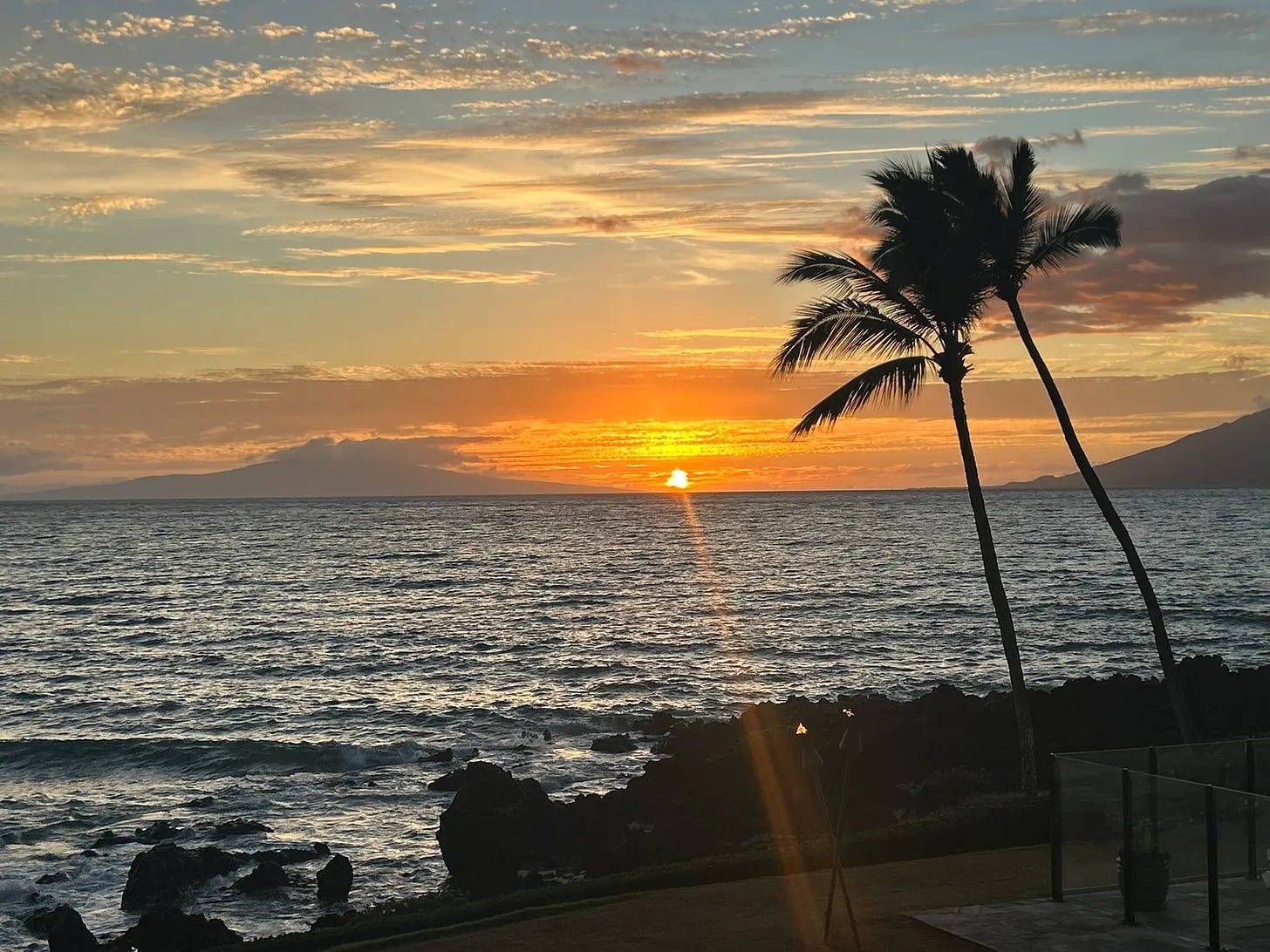You may not believe it, but this has happened to me. It is a rare gift that hits me when I can step outside the prison of time—a sudden state of grace.
Sometimes it’s the way a halo of fallen purple jacaranda petals carpets the sidewalk. Other times it’s how the Matilija poppies, with their delicate white petals and vibrant yellow stamens, explode against the gray June sky.
It can come from the womb of the still, humid present or the sharp bite of the first sip of coffee or the intense sweetness of mangoes, strawberries, and apple bananas.
Then there is when I fully feel my steps upon the ground and enter the flow of seamlessly walking, embodied and joyful. I am captured by the surprisingly intimate gaze of a passing stranger—the dreamy eyes of a distracted young woman in my path, the look of longing on the face of a lonely old man strolling by.
There is no end to the mysteries and wonders of crowds, the aching beauty of the living breathing world.
As Clarice Lispector describes it:
In a state of grace, you often see the profound, but previously unfathomable beauty of another person. Indeed, everything acquires a halo, which is not imaginary: it comes from the glow of the almost mathematical radiation given off by things and people. You begin to feel that everything that exists—be it person or thing—inhales and exhales a subtle glow of energy. The truth of the world is impalpable.
And when it comes, you feel it. I am transformed by a sight, a taste, a sound as they radiate until my whole head bleeds with energy that makes its way to my core, to my legs, all the way down to the soles of my feet before rising back up to the top of my skull. Then there is no skull, only eyes and sky.
It is pure exuberance. From where it comes, I don’t know.
Lispector again observes:
And there’s a feeling of incomparable physical well-being. The body is transformed into a gift. And you feel it is a gift because you are experiencing, directly, the undoubted gift of physical existing.
While I’m not sure if I should go so far as to describe these states of being I’ve known as mystical, Barbara Ehrenreich in Living with a Wild God: A Nonbelievers Search for the Truth of Everything explores the wonders of the mind and transformational psychological states, admitting in her introduction that she was “afraid of seeming crazy” as “a rationalist, an atheist, a scientist by training” who should have no use in the great progressive project “of trying to retain a foothold on the planet for future generations.” But, nonetheless, as her book goes on to outline, not all our experiences fit neatly into our “mundane calculations.” There is the moment when she finds, “Nothing could contain it. Everything ‘inside’ and out, the only condition was overflow” and other times when all is “blazing—incandescent” full of the “rage of joy, of exuberance.”
The ecstatic instant exists. It gives us glimpses of reality beyond our world of screens and our thoroughly debased social context, but, alas, it is usually simply that, an opening, a stolen moment. As Lispector observes, “We must remember that the state of grace is merely a chink through which we can peer into a land that is a kind of calm paradise, but is not the entrance to that paradise, nor does it give us the right to eat of its trees.”
The clear-eyed work of building a world informed by grace is still there for us, but life need not be dreadful, nor devoid of poetry. In fact, that might be just what we need most—imagination, joy, and an insistence that everyone should have fullest possible life in all its manifestations as their birthright.
Note on the Summer Chronicles:
Over a decade ago, during my time writing for the OB Rag and SD Free Press, I penned a series of pieces over the summer that moved beyond the blog/column form to something a little looser and more open to improvisation and the poetic turn.
Below is the original preface for the first series of chronicles:
In the summer of 1967, the great Brazilian writer, Clarice Lispector, began a seven year stint as a writer for Jornal de Brasil [The Brazilian News ] not as a reporter but as a writer of "chronicles," a genre peculiar to Brazil. As Giovanni Pontiero puts it in the preface to Selected Chrônicas, a chronicle, "allows poets and writers to address a wider readership on a vast range of topics and themes. The general tone is one of greater freedom and intimacy than one finds in comparable articles or columns in the European or U.S. Press."
What Lispector left us with is an eccentric collection of "aphorisms, diary entries, reminiscences, travel notes, interviews, serialized stories, essays, loosely defined as chronicles." As a novelist, Pontiero tells us, Lispector was anxious about her relationship with the genre, apprehensive of writing too much and too often, of, as she put it, "contaminating the word." It was a genre alien to her introspective nature and one that challenged her to adapt.
More than forty years later, in Southern California—in San Diego no less—I look to Lispector with sufficient humility and irony from my place on the far margins of literary history with three novels and a few other books largely set in our minor league corner of the universe. Along with this weekly column, it's not much compared to the gravitas of someone like Lispector. So, as Allen Ginsberg once said of Whitman, "I touch your book and feel absurd."
Nonetheless the urge to narrate persists. Along with Lispector, I am cursed with it—for better or worse. So for a few lazy weeks of summer, I will try my hand at the form.




